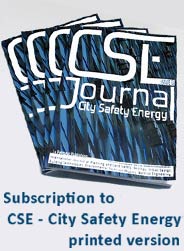Focus and Scope
Section Policies
EDITORIAL
Editors- CSE Journal Administrator
GEOLOGY
- Experience and reduction of the following natural hazard: Earthquake hazards, Volcanic hazards, Landslide and avalanche hazards, Severe storm hazards, Flood hazards, Drought hazards, Wildfire hazards, Climate change and environmental hazards
- Types and dimensions of Natural Disaster
- Risk identification
- Risk and vulnerability assessments
- Natural Disaster Risk management: Encouragement vulnerability reduction and mitigation measures, Promotion of suitable land-use planning, environmental management and construction standards in new development, Support by incentives (such as technical aided, benchmarks, certification advertising and awards) for better practices and attention to the risk of natural hazard risks
Editors- CSE Journal Administrator
PLANNING AND LAND SAFETY
- Urban land use planning
- Land use detailed planning
- Regional planning
- Environmental planning
- Landscape design
- Soil consumption and conservation
- Urban land value
- Environmental impact assessment
- Multicriteria evaluation for urban and regional planning
- Planning and climate change
- Thermal effects of urban green areas
- Planning in hazardous areas
- Brownfield regeneration
Editors- CSE Journal Administrator
SUSTAINABLE URBAN MOBILITY
- Sustainable mobility in urban areas (case studies and best practices)
- Route quality, also for non-motorised road users
- Levels of accessibility of urban poles generating traffic flows
- Road safety for vulnerable road users
- Integration of traffic, mobility and urban planning techniques
- Potential contribution of Intelligent Transportation Systems (ITS)
Editors- CSE Journal Administrator
ENVIRONMENTAL DESIGN
- Brownfield and greyfield recovery
- Sustainable design for coastal areas
- Sustainable townscape design
- River restoration
- Stormwater sustainable management
- Green and blue infrastructures
- Building retrofit technologies
- Open space recovery through microclimate control, vegetation reintroduction, use of ecological materials
Editors- CSE Journal Administrator
BUILDING TECHNOLOGIES
- Advanced materials and technologies
- Building components and systems: innovative European experiences
- House comfort and energy savings
- Innovative management of construction processes
- Recycling of construction waste
- Technology and industrialisation
- European rules and regulations
Editors- CSE Journal Administrator
ENERGY EFFICIENCY IN BUILDINGS AND DISTRICTS
- Strategies for urban sustainable development: new areas and refurbishment of existing districts
- District heating and cooling techniques
- Energy storage and green conversion from renewable sources at urban and district scale
- Vehicle sharing and green mobility
- Smart energy grids and electricity networks
- Energy distributed generation
- Energy-efficient urban lighting technologies
- Evaluation methodology for urban energy efficiency and comfort
- Sustainable policies for the reduction of city pollution
- Strategies for decision making by energy planners: meeting the Kyoto protocol and the future low-carbon targets of European Community
Editors- CSE Journal Administrator
MATERIALS ENGINEERING
- New sustainable materials for structural and non-structural applications
- Materials and methods for rehabilitating the built heritage
- Integration of different materials and systems for energy efficiency in buildings
- Materials durability
- Property enhancement of concrete and mortars
- Polymeric materials for building and architectural applications
- Ecofriendly materials
Editors- CSE Journal Administrator
BOOK REVIEWS
Editors- CSE Journal Administrator
Peer Review Process
The CSE Journal uses the double blind peer review process. Each submission must be anonymous. The selection of reviewers for each submission is made by the editors and takes into account many factors, including the knowledge of and experience. Each work submitted for publication is first read by at least one of the editors. If the editor deems the submission corresponding to the standards of the CSE Journal, he sends it to two reviewers for a thorough evaluation. The purpose of the review is to provide authors with a reasoned opinion on the quality of the proposal. Any revisions should also provide authors with guidance on how to improve their essays to be able to publish the journal. The peer review process, as well as all the whole editorial flow is managed through the platform OJS.
We report average times for the management of the publishing process:
- Readingby the Scientific Panel/Editorial Board: within 3 weeks of submission;
- First round of peer-review: within 4 weeks of the grant date;
- Communication to the author: within 7 weeks of submission;
- Time for any changes the author: within 3 weeks of the request changes;
- Final editorial decision: within 2 weeks of receipt of the amended version.
Publication Frequency
The CSE Journal has two yearly issues, spring and fall. Output Number 1 March 2014.
Archiving
This journal utilizes the LOCKSS system to create a distributed archiving system among participating libraries and permits those libraries to create permanent archives of the journal for purposes of preservation and restoration. More...
CSE Journal - City Safety Energy is a semiannual journal (Two ISSUES per Year) published by Le Penseur in Brienza (PZ) - Italy | ISSN print edition 2283-8767 | ISSN online edition 2284-3418 - Journal registerd at the Court of Potenza (Italy) n. 219/2014


